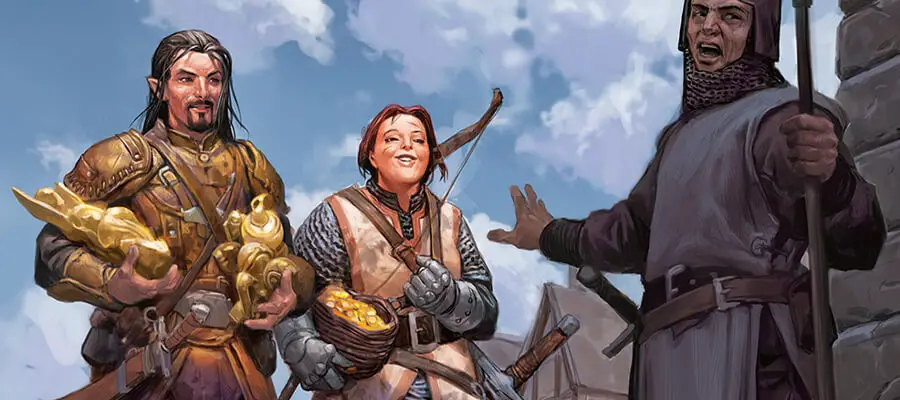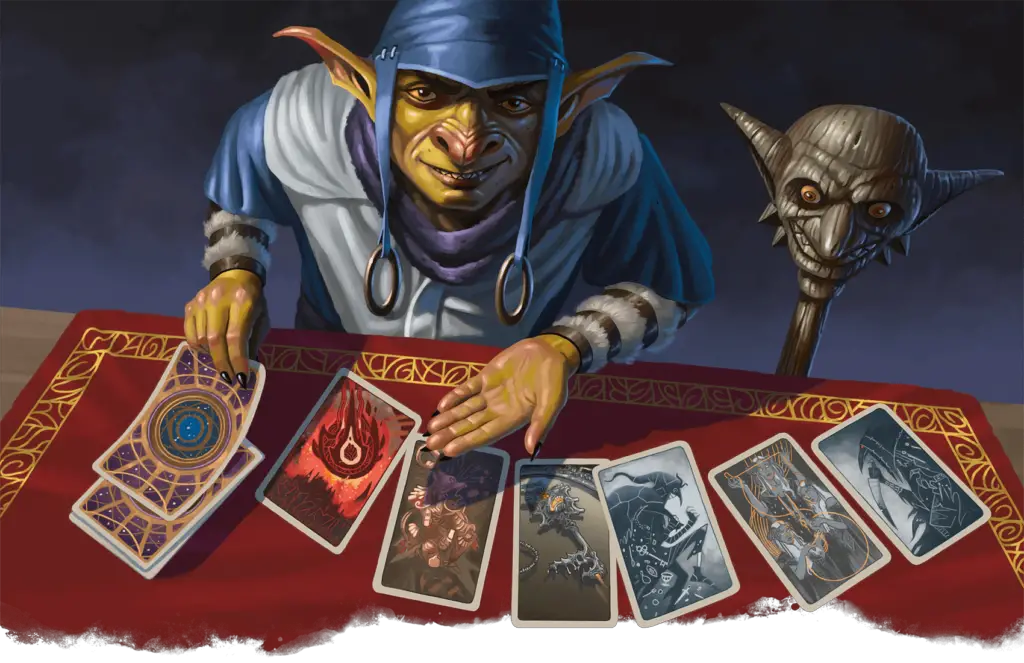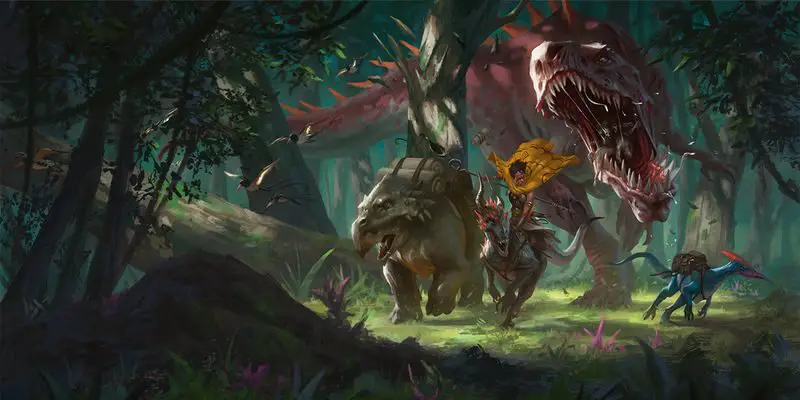This article about customizing D&D campaigns to player expectations gets its featured image from Ghosts of Saltmarsh. This article contains affiliate links to put gold in our coffers.
In a game of Dungeons & Dragons, every player brings their own set of expectations to the table. The more the game meets these expectations, the more fun each player will have.
These expectations, however, go beyond “play in a high fantasy campaign,” “save the world,” or even “fight a dragon.” Whether consciously or subconsciously, each player comes to the table with a complex suite of expectations for gameplay, narrative, and beyond—expectations that a savvy Dungeon Master can fulfill by customizing their campaign to match.
Understanding Player Expectations
Player expectations can be sorted into three main categories:
- Verbs. What do I want to do?
- Goals. What do I want to achieve by doing it?
- Methods. How do I want to do it?
Verbs are the building blocks of sessions. They dictate what your players will do in each “episode” of a campaign.
Goals are the building blocks of adventures. They dictate what your players will “accomplish” in the course of an arc—what each “episode” of the campaign ultimately builds toward.
Methods, meanwhile, are the building blocks of scenes. They dictate, beat-by-beat, the actions that the players will take in-game.
These categories can stretch across each of the pillars of Dungeons & Dragons gameplay—from combat to exploration, socialization, and more. For example:
- Combat. I want to help (verb) my teammates defeat Tiamat (goal) by healing (method) them.
- Exploration. I want to explore (verb) the jungles of Chult to find the lost city of Omu (goal) by investigating ancient ruins (method).
- Socialization. I want to persuade (verb) the Xanathar to help us find the treasure (goal) by bribing him (method).
In order to understand which expectations our players bring to the table, however, we need to first begin by understanding our players—and their characters—both at and away from the table.
Identifying Verbs
We can identify a player’s expected or preferred verbs in a number of ways.
First, we can look at their character’s personality traits, as listed on their character sheet. For example, a player who builds a character with the personality trait “I can stare down a hellhound without flinching” likely expects (and, in fact, hopes) to be put into situations in which they can stare down a hellhound (or an equally intimidating enemy). Similarly, a character with the personality trait “I bluntly say what other people are hinting at or hiding” is likely built for scenes in which other characters are refusing to acknowledge an unmistakable truth.
Second, we can look at their character’s in-game interactions, as observed in previous sessions. This is an example of a “revealed preference”: While a player might not have said explicitly that they’ve built their character to be a mobile striker, an observation that their character constantly darts around the battlefield is good evidence that this player might enjoy more opportunities to gain and deploy mobility. Similarly, a player who spends lots of time trying to parlay with hostile enemies instead of fighting them is very likely hoping for an enemy who can be meaningfully calmed—and perhaps even recruited.
Third, we can just…ask the player outright. An out-of-game conversation about what situations the player is hoping to encounter and how they’d like to approach them can be surprisingly fruitful! You might never have guessed that this player dreams of solving a murder mystery, training a dragon, or fighting their way through the Nine Hells—which is why it’s all the more important to ask.
Fourth and finally, you can use a player’s methods (see below) to guess what sort of verbs that player would like to do. A player who invests into Wisdom (Survival), extra rations and rope, and Leomund’s Tiny Hut certainly seems to be preparing for an expedition into the wilderness—so why not give them one?
Identifying Goals
Just like verbs, we can identify a player’s expected or preferred goals in a number of ways.
First, we can ask them outright—either when planning or choosing the campaign in session zero, or by having an out-of-game conversation about it. It’s important, however, to distinguish between “verbs” and “goals” when having these conversations. A “verb” is what happens at the table. A “goal” is part of the narrative that the table creates—it’s not what a character does, but who a character is. Does a player want their character to be “the hero that defeated Tiamat,” or “the explorer who found the lost city of Omu?” It’s not even necessary to get that fine-grained—simply being “a silver-tongued persuasive speaker” is a fine goal for a high-Charisma character to have.
Second, we can look at that character’s bonds, ideals, and flaws. A character with the bond “My town or city is my home, and I’ll fight to defend it” likely expects to defend that town or city. A character with the ideal “Our lot is to lay down our lives in defense of others” likely expects to take on a high-risk challenge to save innocent lives. A character with the flaw “I can’t help but pocket loose coins and other trinkets I come across” likely expects to pick up something important, with real subsequent significance.
Third, as before, we can look at that character’s in-game interactions. How does that character represent themselves to others? Do they claim to be “the best thief south of Neverwinter?” Do they solemnly vow to defend each friendly NPC they come across? Give characters the opportunity to prove their chosen reputations.
Identifying Methods
Unlike verbs and goals, methods provide a notably mechanical set of expectations. Players, when building a character, invest in certain tools and resources. Once they’ve made these investments, it’s perfectly natural for players to expect a chance to use them—and to receive a meaningful payoff for doing so.
First, we can look at a character’s class and subclass features. A cleric with the Channel Divinity: Turn Undead feature likely expects an opportunity to drive back a mighty skeletal horde through the power of faith alone. A wizard of the School of Transmutation likely expects an opportunity to grant another creature darkvision, or to preemptively prepare resistance to a certain type of elemental damage—as when preparing to fight a dragon, for example.
Second, we can look at a character’s feats, items, and spells. A character with the Sentinel feat likely hopes to face an enemy with high mobility—all the better to shut down with endless opportunity attacks. A character with ample supplies of ball-bearings or caltrops would likely enjoy a chance to fortify a location, especially one with a choke point. Meanwhile, a character who prepares the (oft-ignored) gaseous form spell would almost certainly enjoy an opportunity to infiltrate a well-fortified compound.
Third and last, we can look at a character’s skills and proficiencies. If a character has expertise in Animal Handling, they likely expect that there are animals to be handled! If a character is proficient in Dragonchess, they (at the very least) expect the game of Dragonchess to be at least somewhat present in the world around them.
Putting It Together
Once you’ve identified each character’s expected verbs, goals, and methods, here’s a simple formula to customize your sessions and campaign accordingly:
- For each verb, create a scenario where using that verb produces an optimal outcome.
- For each goal, create a scenario where pursuing that goal is necessary or leads to a preferred outcome.
- For each method, create a scenario where using that method makes the party more efficient or safe.
That’s not to say that you need to use every character’s verbs, goals, and methods in every single session, let alone every single scene. But as you’re planning out a session—or an adventure arc, or a scene—it’s a helpful thing to keep in mind.
After all, it’s not your story that the players are here for.
It’s theirs.
About the Author: DragnaCarta is a guest writer for FlutesLoot.com and a veteran DM with 12+ years of experience. He is the author of the popular “Curse of Strahd: Reloaded” campaign guide and the Dungeon Master and director for the Curse of Strahd livestream “Twice Bitten.” You can get his personal RPG mentoring plus early access to projects by joining his Patreon.
Cast Message in the comments section below to ask DragnaCarta about this topic. You can find other articles by DragnaCarta on FlutesLoot.com.




